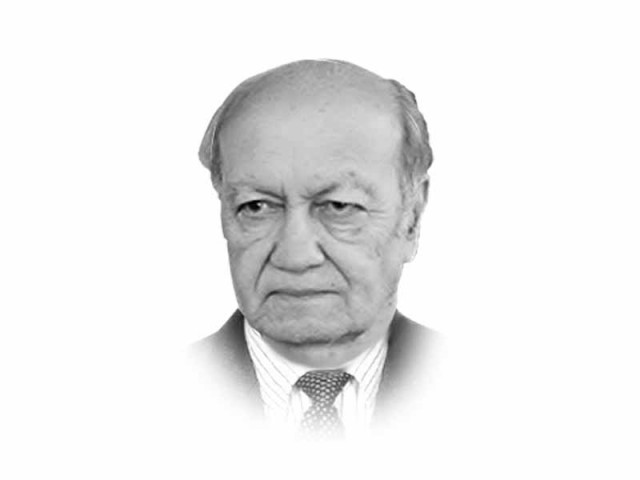Afghanistan’s uncertain future
And it is with them that it has to negotiate to exit safely

The writer is a retired lieutenant general of the Pakistan Army and a former federal secretary. He has also served as chairman of the Pakistan Ordnance Factories Board
There were other factors for the breakdown of talks. The Taliban shura too had opposed the assembly of the Taliban leadership at Camp David before an agreement was signed, as it would have given an impression of subservience to the United States. Mullah Barader had taken this decision but had to retract it when it was opposed by his senior colleagues. Sooner or later, the talks should resume otherwise the civil war would intensify. Meanwhile, the United States has stepped up it's bombing on Taliban hideouts with greater ferocity and the Taliban are reciprocating by increasing their attacks on Afghan army and government installations. This is a dangerous trend that could create fissures in Afghan society and forestall the prospects of peace. The warlords are waiting in the wings and will exploit the anarchy to spread their influence. And Ashraf Ghani’s influence will further diminish in the developing scenario.
The role of Pakistan in these difficult circumstances becomes even more challenging.
Pakistan should strive to ensure that its relations and trust level with the Afghan government remains high.
The Taliban leadership, with their writ extending nearly over two-thirds of Afghanistan, is less amenable to Pakistani influence than it was in the past. Nonetheless, Pakistan’s fundamental interest lies in a peaceful and stable Afghanistan. However, it is one thing to wish this ideal scenario; the reality is likely to be messy. Pakistan should remain equally prepared to safeguard its borders if anarchy were to spread. It will have to take necessary measures against a large influx of refugees in the event infighting among various factions ensues.
The inter-Afghan dialogue that was to take place in Norway had to be canceled at the last moment as a consequence of the growing rift between the United States and Taliban.
The breakdown of talks has given President Ashraf Ghani an opportunity to push for national elections on the revised date of September 28, 2019. These had been postponed several times due to changes in election laws and innumerable management and technical problems. The election of the president will now coincide with local council votes and delayed parliamentary elections in the Ghazni province.
President Ghani, expecting bright chances of winning, is very keen to hold the presidential elections on the proposed dates despite serious opposition by other factions. Even the United States is not interested, as it would create problems in their exit strategy. The fear of the Taliban stepping up their violence during elections is also a consideration.
The apprehension that al Qaeda will emerge once US forces withdraw remains a distinct possibility considering the old bonds that exist between the Taliban leadership and theirs. Al Qaeda coexisted during the previous Taliban regime and was its ally in some ways. So what assurances are the Taliban giving that they do not emerge once US forces leave? Do they or the Afghan army have the capacity to confront and deny them the space in Afghanistan?
Modi’s government was uneasy with the US-Taliban rapprochement and was even expected to disrupt the process. However, the present rupture in the US-Taliban relationship suits them. They feel that with a Taliban-dominated government they will lose the clout they presently enjoy. Although it is possible that once the Taliban gain power, realising the emerging reality they may try to engage with their leadership and find ways of working with them.
President Trump was keen on reconciliation with the Taliban as a policy objective because he had seen the reality that military operations spread over 18 years have failed. And reconciliation through dialogue was the answer. This is what Pakistan had been insisting on — that Afghanistan needs a political solution and armed conflict would lead to nothing except more misery for the Afghan people. So the present breakdown is unfortunate. It is hoped that sanity will prevail and the United States and the Taliban will get back on the negotiating table and finalise the peace agreement. And the Afghan government and other Afghan factions are also a party to the final settlement.
The growing tension between Iran and Saudi Arabia after the recent drone attacks on the Aramco oil facilities in eastern Saudi Arabia may temporarily shift the United States’ focus away from Afghanistan, but it cannot afford to neglect it for too long.
In these last 18 years, the United States’ strategy and goals for Afghanistan have changed dramatically. While it initially focused on the prosecution of terrorism, it later became ambitious in trying to build an effective Afghan state. It has tried to build a democratic state in a highly tribal society. But the irony is that while it leaves Afghanistan it finds nearly two-thirds of the country in control of the Taliban — the very anti-thesis of democracy. And it is with them that it has to negotiate to exit safely. Its assumption is that it can live with the radical Taliban provided they ensure that they will give no space to al Qaeda and its affiliates. Even these modest aims have yet to be realised. Only time will tell what would be the long-term implications for the credibility of American power by its Afghan experience, only time will tell.
Published in The Express Tribune, September 18th, 2019.
Like Opinion & Editorial on Facebook, follow @ETOpEd on Twitter to receive all updates on all our daily pieces.















COMMENTS
Comments are moderated and generally will be posted if they are on-topic and not abusive.
For more information, please see our Comments FAQ